
Selena Quintanilla-Pérez was an American singer. Referred to as the "Queen of Tejano Music", her contributions to music and fashion made her one of the most celebrated Mexican-American entertainers of the late 20th century. In 2020, Billboard magazine put her in third place on their list of "Greatest Latino Artists of All Time", based on both Latin albums and Latin songs chart. Media outlets called her the "Tejano Madonna" for her clothing choices. She also ranks among the most influential Latin artists of all time and is credited for catapulting the Tejano genre into the mainstream market.

Amor Prohibido is the fourth studio album by American singer Selena, released on March 22, 1994, by EMI Latin. Having reached a core fan base, the label aimed to broaden her appeal with the next studio release. Finding it challenging to write a follow-up hit after "Como la Flor" (1992), Selena's brother A. B. Quintanilla enlisted the assistance from band members Ricky Vela and Pete Astudillo with writing the album's songs. The resulting album has a more mature sound featuring experimental production that blends diverse musical styles from ranchera to hip-hop music. Amor Prohibido is a Tejano cumbia album modernized with a synthesizer-rich delivery using a minimalist style that was quintessential in early 1990s Tejano music.

Ven Conmigo is the second studio album by American singer Selena, released on November 12, 1990, by EMI Latin. The singer's brother, A.B. Quintanilla III remained her principal record producer and songwriter after her debut album's moderate success. Selena's Los Dinos band composed and arranged seven of the album's ten tracks; local songwriter Johnny Herrera also provided songs for Selena to record. Ven Conmigo contains half cumbias and half rancheras, though the album includes other genres. Its musical compositions are varied and demonstrate an evolving maturity in Selena's basic Tejano sound. The album's structure and track organization were unconventional compared with other Tejano music albums. The songs on Ven Conmigo are mostly love songs or songs following a woman's struggles after many failed relationships.
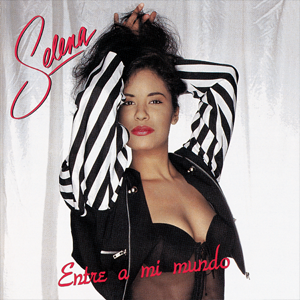
Entre a Mi Mundo is the third studio album by American singer Selena, released on May 6, 1992, by EMI Latin. The label endeavored to bolster Selena's popularity within the Latin music market in the United States with this release. Selena's brother, A. B. Quintanilla kept his role as the singer's producer and, in collaboration with Selena y Los Dinos members Pete Astudillo and Ricky Vela, composed tracks for the album. The ensuing recording encompassed an eclectic array of songs, attributable to the members' diverse backgrounds, which facilitated the modernization of the many genres they explored. Entre a Mi Mundo is a Tejano cumbia album that encapsulated Selena's quintessential sound, characterized by engaging tunes harmonized with her distinctive, plaintive vocals and a relaxed, danceable cumbia beat. The album incorporates musical inspirations from power pop, R&B, disco, rock, funk, and synthesized Tejano music.

Selena is the debut studio album by American Tejano singer Selena, released on October 17, 1989, by EMI Latin. Its music incorporates a range of contemporary genres with a mix of cumbia and regional styles of Mexican music. The album was released following company president Jose Behar's failed crossover request for the singer. The project was denied by the heads of EMI Records' pop division, believing the singer should first strengthen her fanbase. Selena's brother and principal record producer and songwriter, A.B. Quintanilla III fought to remain the singer's producer. The band introduced Pete Astudillo and Joe Ojeda, who contributed to the album's experimental production and songwriting. Aside from A.B., Selena worked with two Mexican songwriters, Alejandro Montealegre and Reinaldo Ornelas.

Live! or Selena Live! is a live album by American Tejano pop singer Selena, which was released on May 4, 1993, by EMI Latin. The album was re-released on September 22, 2002, as being part of the Selena: 20 Years of Music collection; which included spoken liner notes by her family, friends and her former band members Selena y Los Dinos. Live! includes three cumbia-influenced studio tracks, while the rest of the album consists of live versions of previously released songs. The album was recorded during a free concert at the Memorial Coliseum in Corpus Christi, Texas, on February 7, 1993. It was certified gold by the Recording Industry Association of America in its first year, double platinum in 1995, and 8× platinum in 2017.

Mis Mejores Canciones – 17 Super Éxitos is a greatest hits album by American singer Selena released on September 17, 1993, through EMI Latin. Beginning in January 1993, the label released a comprehensive collection that spotlighted its Latin music artists as part of its Latin Classics series. Mis Mejores Canciones – 17 Super Exitos encompasses 17 tracks, ranging from songs recorded on her debut album with EMI Latin, to songs present in Entre a Mi Mundo (1992). The album received a positive response from music critics who enjoyed the label's catalog releases and praised the tracks on the album for showcasing Selena's early popular recordings. Following the shooting death of Selena on March 31, 1995, Mis Mejores Canciones – 17 Super Exitos debuted at number one on the US Billboard Top Catalog Albums chart, the first Spanish-language recording to do so. The Recording Industry Association of America (RIAA) certified the album diamond (Latin), denoting 600,000 units shipped in the United States.

Anthology is the first box set by American singer Selena. It was released posthumously on April 7, 1998, through EMI Latin to commemorate the singer's works. The collection comprises 30 tracks, dispersed across three genre-themed discs: "Pop / English" showcases uptempo pop compositions, "Mariachi" highlights Mexican ballads featuring poignant narratives of heartache, and "Cumbia" presents danceable tropical rhythms. The album encompasses recordings from a 14-year-old Selena on her Alpha (1986) album to the posthumous "Disco Medley" (1997). With a limited number of unaltered tracks, Anthology predominantly features reworked and remastered musical arrangements, while preserving the singer's original vocals. Selena's death in March 1995 prompted an influx of requests from her admirers. The singer's father and manager, Abraham Quintanilla, expressed a desire to maintain his daughter's legacy through her music. However, Selena's family has faced criticism from both fans and the media, who accuse them of capitalizing on her death and commodifying her repertoire.

"No Me Queda Más" is a song by American singer Selena on her fourth studio album, Amor Prohibido. It was released as the third single from the album in October 1994 by EMI Latin. "No Me Queda Más" was written by Ricky Vela, and production was handled by Selena's brother A.B. Quintanilla. A downtempo mariachi and pop ballad, "No Me Queda Más" portrays the ranchera storyline of a woman in agony after the end of a relationship. Its lyrics express an unrequited love, the singer wishing the best for her former lover and his new partner.
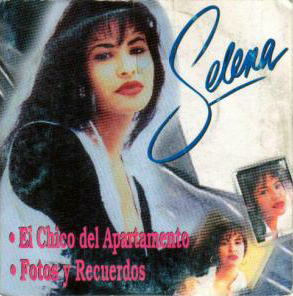
"Fotos y Recuerdos" is a song recorded by American recording artist Selena for her fourth studio album, Amor Prohibido (1994). It was released by EMI Latin in January 1995, as the fourth single. A cover version of the Pretenders' 1983 single "Back on the Chain Gang", "Fotos y Recuerdos" was written by Chrissie Hynde with Spanish-language lyrics by Ricky Vela. Lyrically, the song describes a lonely female protagonist who "kisses the photo of her [lover] each night before falling asleep."

"Techno Cumbia" is a song recorded by American singer Selena for her fourth studio album, Amor Prohibido (1994). It was posthumously released as the b-side track to "Dreaming of You" through EMI Latin on August 14, 1995. Techno Cumbia would be put on her fifth and final studio album Dreaming of You (1995) and would be the fourth single for Dreaming Of You. "Techno Cumbia" was written by Pete Astudillo and co-written and produced by Selena's brother-producer A.B. Quintanilla. The song is a dance-pop and tecnocumbia recording with influences of dancehall, rap, Latin dance, and club music. Lyrically, Selena calls on people to dance her new style the "techno cumbia" and calls out those who cannot dance.
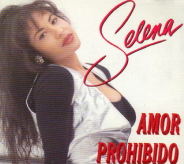
"Amor Prohibido" is the title song of American Tejano singer Selena's fourth studio album of the same name (1994). Released as the lead single through EMI Latin on April 13, 1994, it was written by Selena, her brother and music producer A.B. Quintanilla III, and her band's backup vocalist Pete Astudillo. A popular interpretation compares it to Romeo and Juliet.
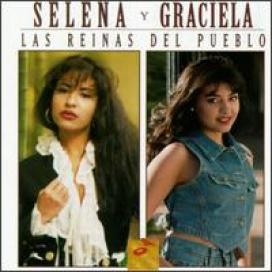
Las Reinas del Pueblo is a compilation album by American Tejano music singer Selena and Mexican banda singer Graciela Beltrán. It was released on April 4, 1995, by EMI Latin in the wake of Selena's death on March 31, 1995. The decision to produce a compilation album featuring Beltrán emerged after her tribute to the singer at a Houston memorial. The title was inspired by Mexican newspapers that referred to Selena as "an artist of the people" during a 1992 press tour in the nation and subsequently dubbed her "La Reina del Pueblo" in the aftermath of her death. Las Reinas del Pueblo encompasses six tracks by Selena and six by Beltrán, encapsulating their respective tenures with EMI Latin. Las Reinas del Pueblo peaked at number four on the US Billboard Top Latin Albums and Regional Mexican Albums chart, both behind other Selena releases. The recording peaked at number 147 on the American Billboard 200 chart. The album peaked at number ten on the Spanish albums chart in 2010. Beltrán's participation in the album yielded substantial promotional and sales enhancements.

"La Llamada" is a song recorded by American recording artist Selena for her first live album Live! (1993). It was composed by Selena y Los Dinos backup singer Pete Astudillo and Selena's brother and principal record producer A.B. Quintanilla III and produced by Quintanilla III and Argentine music producer Bebu Silvetti. "La Llamada" was released as the second single from Live!. "La Llamada" is an uptempo Mexican cumbia song centering on female empowerment. Lyrically, the song sees Selena break up with her cheating boyfriend over the phone.

"Como la Flor" is a song recorded by American singer Selena. Written by A. B. Quintanilla and Pete Astudillo, it was released as the second single from her third studio album Entre a Mi Mundo (1992). The song was written by Quintanilla, who was inspired by a family selling illuminated plastic flowers at a concert in Sacramento, California, in 1982. A decade later, Quintanilla was seized with an infectious melody and abruptly dashed out of the shower in a hotel room in Bryan, Texas, to recreate it on a keyboard with Astudillo. He completed the music in just 20 minutes, while Astudillo took another hour to complete the lyrics. "Como la Flor" is an up-tempo, Tejano cumbia torch song that blends tropical cumbia rhythms with hints of reggae and pop music. Its lyrics describe the feelings of a female protagonist addressing her former lover, who abandoned her for another partner. The narrator is uncertain of her ability to love again, while at the same time, wishing her former partner and his new lover the best.
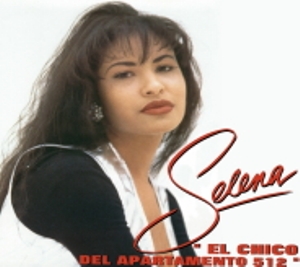
"El Chico del Apartamento 512" is a song recorded by American recording artist Selena for her fourth studio album, Amor Prohibido (1994). It was released along with "Fotos y Recuerdos" in January 1995, serving as its B-side track. Written by Ricky Vela, "El Chico del Apartamento 512" is a cumbia song with influences of Colombian and South American music. Lyrically, the song describes a female protagonist who knocks on her love interest's apartment door and is heartbroken when his sister answers it. Justino Aguilar of Billboard magazine, called "El Chico del Apartamento 512" as one of Selena's "most memorable songs". The track posthumously peaked at number one on the U.S. Billboard Regional Mexican Digital Songs chart in 2011.

"Baila Esta Cumbia" is a song recorded by American Tejano singer Selena for her second studio album, Ven Conmigo (1990). It was released as the second single by EMI Latin on August 28, 1990, behind "Ya Ves". It was composed by her brother–producer A.B. Quintanilla, and Selena y Los Dinos backup dancer, Pete Astudillo. The recording is an up-tempo Mexican cumbia song. It was well received by music critics who enjoyed its cumbia-feel and rhythm.


















